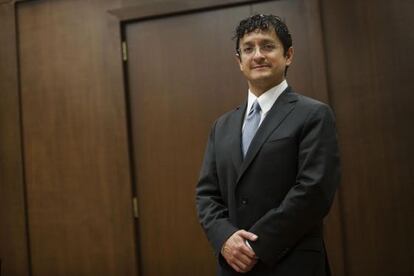“I’m independent because I’m subject to the law and public scrutiny”
Mexico's new anti-corruption czar is to investigate the first lady’s property purchases


Mexico’s newly appointed secretary for the civil service, Virgilio Andrade, has one of the most difficult roles of this current presidential term.
Andrade has been tasked with investigating whether or not there was any conflict of interest in the property purchases made by President Enrique Peña Nieto, his wife Angélica Rivera, and Treasury Secretary Luis Videgaray from a group businessmen who were given fat government contracts. It was Peña Nieto himself who ordered Andrade to conduct the inquiry.
The 48-year-old Mexico City native was sworn in as Mexico's anti-corruption czar last Tuesday. On Friday night, he met EL PAÍS at his office located in one of the city’s largest boulevards.
I have been in the PRI, but this is not a partisan debate”
Question. Are you independent?
Answer. Yes, because I am subject to the law, Congress and public scrutiny.
Q. Peña Nieto appointed you, and the secretary of the Treasury, Luis Videgaray, is a close friend of yours. Can you be impartial given that?
A. Absolutely, because I fall under specific rules and laws, and I have to account to Congress.
Q. What is your relationship with Videgaray?
A. Right now it is a working relationship, with a member of the Cabinet.
Q. But you have been friends?
A. Yes.
Q. And the president?
A. The president has insisted he has no friends. It is a premise of the job of head of state.
Q. You never had a friendly relationship?
A. I think that the president was clear about it.
Q. Are you a member of Peña Nieto’s Institutional Revolutionary Party (PRI)?
We will investigate contracts between the government and certain individuals linked to services involved in the property transactions”
A. I have been in the PRI, but this is not a partisan debate. This is not what it is all about. And besides, you can check my public performance: impartiality forms part of my duties. I was adviser to the Federal Electoral Institute from 2003 to 2010; the first time around I was voted in by four parties: the PRI, the PAN [National Action Party], the Green Party and Citizens’ Movement. And after 2007, I stayed on with the support of the PRI, the PAN, the PRD [Democratic Revolutionary Party] and the Green Party.
Q. Give me a short definition of conflict of interest.
A. When a private individual or elected official gains undue advantages linked to past or present relationships.
Q. Undue advantage can mean low interest rates on home loans?
A. Undue advantage means the misuse of resources.
Q. But is profit not a resource?
A. That’s part of the debate on conflict of interest.
Q. There is debate about the limits of your work. Will you be able to investigate the confidential contracts, for example, that the president’s wife and secretary of the Treasury made with the businessman who sold them properties?
A. The first thing we will investigate will be the contracts between the government and certain individuals linked to government services involved in the property transactions. Second, the financial disclosures of the public servants themselves will be investigated. And we will contrast the contracts that were previously signed with the statements. But the initial part focuses on ...
Q. To see if the companies benefited?
A. Exactly. On whether there was an irregularity, and for that reason, if there was a benefit received.
If any irregularities are detected, they will be analyzed to see whether there was a conflict of interest and will be reported”
Q. What will you do if you encounter any irregularities?
A. If any irregularities are detected, they will be analyzed to see whether there was a conflict of interest and then it will be reported.
Q. Reported to whom?
A. There are consequences. First of all, there are administrative sanctions for both public servants and private individuals, which involve barring them from competing for government contracts in the future. And this could also result in a criminal case.
Q. If you find that Peña Nieto committed any irregularities, what would you do? Would you ask for the president to be sanctioned?
A. The president is subject to the stipulations of Congress because he swore to obey the Constitution and the laws. You also need to bear in mind that besides the president, there are other officials who establish direct relationships with contractors.
Q. But if you discover a conflict of interest, whom would you go to, the prosecutor or Congress?
A. Any decision issued by the Secretariat of Civil Service automatically goes to Congress because it is part of the public record and the secretary’s own duty.
Q. But you won’t go to a prosecutor?
A. Yes, if a crime is committed. But not all offenses are crimes.
Q. The president has broad immunity; he can only be subjected to proceedings for high treason or a felony. Does that shield him from conflict of interest?
A. It is not that he has immunity but the conflict of interest can be seen through other situations in Congress.
Q. Who will be on the panel of experts that will review the research? And how will they do it?
A. They will be highly qualified members with prestige who will give specific contributions.
Q. Will there be an international component?
A. We must think about it. But the international community is present all the time. Mexico is part of the Open Government Partnership. Moreover, the OECD and the UN will participate with their suggestions for good government practices and even monitor projects.
Q. In terms of corruption, where does Mexico stand?
A. There has been some progress made, but it is still clearly insufficient.
Q. And where is the problem?
A. There are lax regulations regarding the relationships between the public and private sectors. For example, in acquisitions, leases and construction projects. There is also a certain lack of control regarding the contact between public servants and those they do business with.
Tu suscripción se está usando en otro dispositivo
¿Quieres añadir otro usuario a tu suscripción?
Si continúas leyendo en este dispositivo, no se podrá leer en el otro.
FlechaTu suscripción se está usando en otro dispositivo y solo puedes acceder a EL PAÍS desde un dispositivo a la vez.
Si quieres compartir tu cuenta, cambia tu suscripción a la modalidad Premium, así podrás añadir otro usuario. Cada uno accederá con su propia cuenta de email, lo que os permitirá personalizar vuestra experiencia en EL PAÍS.
¿Tienes una suscripción de empresa? Accede aquí para contratar más cuentas.
En el caso de no saber quién está usando tu cuenta, te recomendamos cambiar tu contraseña aquí.
Si decides continuar compartiendo tu cuenta, este mensaje se mostrará en tu dispositivo y en el de la otra persona que está usando tu cuenta de forma indefinida, afectando a tu experiencia de lectura. Puedes consultar aquí los términos y condiciones de la suscripción digital.








































